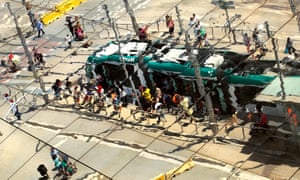The Guardian - Back to home
Global heating: London to have climate similar to Barcelona by 2050
Nearly 80% of cities to undergo dramatic and potentially disastrous changes, study finds
London will have a similar climate in three decades’ time to that of Barcelonatoday, according to research – but if that seems enticing, a warning: the change could be accompanied by severe drought.
Madrid will feel like present-day Marrakech by 2050, and Stockholm like Budapest, according to a report on the likely impacts of the climate crisis. Around the world, cities that are currently in temperate or cold zones in the northern hemisphere will resemble cities more than 600 miles (1,000km) closer to the equator, with damaging effects on health and infrastructure.
Among other analogues, the study suggests Moscow will resemble Sofia, Seattle will feel like San Francisco and New York will be comparable to Virginia Beach. The researchers have created an interactive map showing hundreds of cities and their 2050 counterparts.
Water shortages will affect scores of cities now in temperate climates as a result of the global heating, which is forecast to be by as much as 3.5C in European cities in summer and 4.7C in winter. Nearly eight in 10 cities will experience dramatic changes, according to the study of 520 major cities published in the journal Plos One.
Barcelona was affected by extreme drought just over 10 years ago, endangering many inhabitants and resulting in tens of millions of euros being spent on importing drinking water. It is becoming more likely that London and cities in similar latitudes will experience the same problems in the future, say the researchers.
Among the most concerning findings is that the residents of about a fifth of cities globally – including Jakarta, Singapore, Yangon and Kuala Lumpur – will experience conditions currently not seen in any major cities in the world. This unprecedented level of change “blew my mind”, said Tom Crowther, founder of the Crowther Lab in Switzerland, which carried out the research.
“These are environmental conditions that are not experienced anywhere on the planet at the moment,” he told the Guardian. “That means there will be new political challenges, new infrastructure challenges, that we have not faced before.”
Rainfall will be a particular problem for such cities, with extreme floodingbecoming more common alongside more frequent and severe droughts.
Crowther said: “We are absolutely not prepared for this. Planning for climate change needs to start yesterday. The sooner it starts, the less the impact will be.”
Richard Betts, a professor of climate impacts at Exeter University and head of the climate impacts strategic area at the Met Office Hadley Centre, who was not involved in the research, said: “Without the benefit of knowing that the new climate conditions are already liveable somewhere in the world, it is harder to know whether people will be able to adapt and stay in these cities, or whether they will eventually look to move elsewhere.”
Concern about the world’s lack of preparedness for the effects of global heating is mounting among experts. Mami Mizutori, the UN secretary general’s special representative on disaster risk reduction, last week told the Guardian that climate crisis disasters were happening at the rate of one a week, but that countries were not investing in making urban infrastructure more resistant.
On Wednesday, the UK’s Committee on Climate Change published a report saying the government was completely unprepared for the likely repercussions of the climate crisis. Its chairman, Lord Deben, compared preparations to the efforts of the ramshackle troops of the classic British comedy Dad’s Army.
The new research took as its baseline one of the central forecasts of the Intergovernmental Panel on Climate Change, for a temperature rise of 2C above pre-industrial levels by 2050, which some regard as optimistic considering the current trajectory of greenhouse gas emissions.
Any London homeowners relishing the prospect of a Catalan climate might need to think again. Mike Lockwood, a professor of space environment physics at Reading University, who was not part of the research team, said: “Bringing Barcelona’s climate to London sounds like it could be a good thing, if you don’t suffer from asthma or have a heart condition – except London clay shrinks and is brittle if it gets too dry, then swells and expands when very wet. The greater swings in ground moisture expected in a warmer world would cause massive subsidence problems.”
One of the purposes of the paper is to illustrate the huge problems the world faces as result of the climate emergency. “History has repeatedly shown that data and facts alone do not inspire humans to change their beliefs or act,” said Jean-François Bastin, the lead author of the paper. “The intangible nature of reporting on climate change fails to adequately convey the urgency. It is hard to envisage how 2C of warming, or changes in average temperature by 2100, might impact on daily life.”
Friederike Otto, the deputy director of the Environmental Change Institute at Oxford University, who was not involved in the research, cautioned that it should be regarded “as an illustration only, not a prediction”, because of the number of variables involved. “It is a useful way to start thinking outside the box, but it does not show London’s future. It could well be that rainfall in winter changes in London in the opposite way to Barcelona.”
Mike Childs, the head of science at Friends of the Earth, said policymakers must take note. “What’s great about this report is that it starkly shows what living in cities will be like if the inertia of governments on climate breakdown continues,” he said. “Young people are taking to the streets to stop their futures being wrecked through inaction on the climate crisis, but this analysis demonstrates that anyone under 50 should be equally concerned that urban living could be intolerable by 2050. Governments have no excuse for further inaction.”

Geen opmerkingen:
Een reactie posten
Opmerking: Alleen leden van deze blog kunnen een reactie posten.